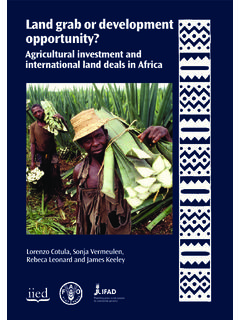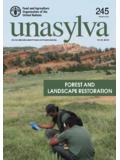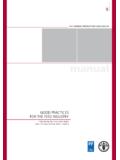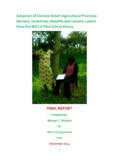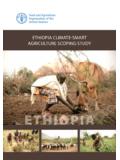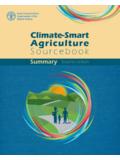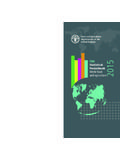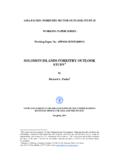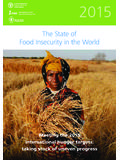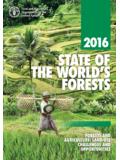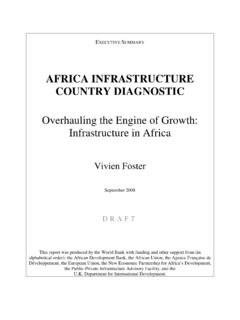Transcription of AFRICAN UNION NEPAD Comprehensive Africa Agriculture ...
1 AFRICAN UNIONC omprehensive Africa Agriculture development ProgrammeNew Partnership for Africa s development ( NEPAD )NEPADAt the invitation of the NEPAD Steering Committee,this document, which presents the ComprehensiveAfrica Agriculture development programme (CAADP)of NEPAD , has been prepared through the facilitationof the Food and Agriculture Organisation of the UnitedNations (FAO) in close collaboration with the NEPADS ecretariat. It has followed a consultative process, thekey elements of which have been as follows: March 2002:Presentation of the main themes ofpotential CAADP contents by the Director General ofFAO to the NEPAD Heads of State ImplementationCommittee in Abuja, Nigeria; End April 2002:Circulation for review and commentof a first draft (at that stage as a summary and threeseparate papers).
2 Distribution was to all AfricanMinisters of Agriculture and for AFRICAN integration;the Heads of AFRICAN Regional EconomicOrganisations; the Chairman and members of theNEPAD Steering Committee; the Heads of the AfricanDevelopment Bank and of other selected AFRICAN sub-regional development banks; the Head of the UNEconomic Commission for Africa ; World Bank agri-culture experts; and for information to theOrganisation for AFRICAN Unity; Early May 2002:Consolidation of the separate papersinto the unified Comprehensive Africa AgricultureDevelopment programme document and integrationof the comments received on the April drafts; Mid-May 2002:Presentation of the first consolidat-ed document for comment at the Maputo meetingof the NEPAD Steering Committee; End May 2002: Recasting of the CAADP draft to takeaccount of the proposals and comments of theNEPAD Steering Committee and circulation to thesame network of reviewers and commentators.
3 June 2002:Meeting in Rome, Italy (9th June 2002)of AFRICAN Ministers of Agriculture (joined by somemembers of the NEPAD Steering Committee) toreview the CAADP (See Annex 1).The International Fund for Agricultural development ,the World Food programme , and the World Bank/Forum for Agricultural Research in Africa partnershiphave also offered important inputs, comments CAADP has been prepared to promote interven-tions that best respond to the widely recognised crisissituation of AFRICAN Agriculture . It has been cast todeliberately focus on investment into the followingthree mutually reinforcing "pillars" that can make theearliest difference to Africa s dire situation: (a) extend-ing the area under sustainable land management andreliable water control systems; (b) improving rural infra-structure and trade-related capacities for improvedmarket access; and (c) increasing food supply andreducing hunger.
4 The CAADP also pays attention toemergencies and disasters that require food and agri-cultural responses or safety nets; if ignored, the dislo-cation caused by these can undermine or reverse devel-opment achievements. In addition, it presents onelong-term "pillar" on agricultural research, technologi-cal dissemination and adoption. In no way is the focus on these pillars intended to implythat other things, such as policy and institutionalreform, capacity building etc are not , these long-term enabling factors should beintegrated into implementation of all the "pillars".However, so deep is Africa s agricultural crisis that pri-ority must go to immediate action that can make theearliest difference and should make use of existingknowledge, capacity, and policy and institutionalarrangements.
5 Action to address the AFRICAN agricultur-al crisis cannot await the achievement of ideal enablingconditions the past decades of undergoing structuralreforms of its economies, policies and institutions haveleft Africa with few discernible benefits for the majori-ty of its people; indeed, there may be no assurance oflong-term betterment from such reforms. Among frequent criticisms of this first version of theCAADP is the lack of explicit reference to gender. Asindicated in Chapter 5, "special attention must be givento the vital food-producing and entrepreneurial roles ofwomen in rural and urban AFRICAN communities. Africanwomen account for substantial amounts of productionin both the informal and formal sectors." It is clearlyessential that gender be a core consideration in opera-tionalising the CAADP; at this stage, the broad pillarsare important for both men and women.
6 With regard tolack of attention to the livestock and fisheries sectors(immediate potential) and to the forestry sector (long-term importance for food security), it is proposed thatthe particular needs of these other land-using sectors betaken up in a linked but separate exercise in the nearfuture without holding back the action on crop produc-tion which can provide the most urgent calorie supply. With the broad lines of the CAADP now available,operationalisation needs to be launched this willrequire leadership by Africa itself, in the spirit of self-reliance that is the hallmark of and scope of the Agriculture ProgrammeJuly 2003 ISBN 0-620-30700-5 Comprehensive Africa Agriculture development ProgrammeNew Partnership for Africa s development ( NEPAD ) NEPAD : Comprehensive Africa Agriculture development programme (CAADP)iiForewordiiiI am pleased to write this foreword on Africa sframework for Agriculture , NEPAD s ComprehensiveAfrica Agriculture development programme (CAADP).
7 The CAADP document is a product of a partnershipbetween NEPAD and the Food and AgricultureOrganisation (FAO) of the United Nations. It is also adirect result of invaluable contributions by multilateralinstitutions such as the International Fund forAgricultural development (FAD), the World FoodProgramme, the World Bank and the Forum forAgricultural Research in Africa (FARA).This document is a result of extensive and thoroughconsultations with a wide range of stakeholders. It isimportant to emphasise, however, that, as a programmefor Agriculture , CAADP is a dynamic document andmust remain open to continued improvement andinterpretation by each of Africa s sub-regions in order tobest address our continent s diverse nearly forty years of economic stagnation, withthe current food crises in the Horn of Africa , SouthernAfrica, and in Central Africa , AFRICAN leaders areapplying themselves to finding sustainable solutions tohunger and poverty.
8 NEPAD believes that agriculturewill provide the engine for growth in agricultural performance is at the heart ofimproved economic development and growth, and itsrole in poverty eradication and in the restoration ofhuman dignity can never be over-emphasised. Toachieve this agricultural renewal in Africa , NEPAD isforging new partnerships, based on AFRICAN ownership,with its traditional partners. More importantly, NEPADis encouraging Africans to utilise their own strengths,abilities, resources and political leadership to generatedevelopment and growth in their own countries and onthe Comprehensive Africa Agriculture DevelopmentProgramme (CAADP) is based on these principles andbears testimony to the high premium NEPAD places onagriculture.
9 This framework clearly reaffirms that, as wecontinue to sharpen our focus on implementationstrategies of this world-acclaimed developmentinitiative, we have moved beyond the level of mererhetoric to the concrete and pragmatic stage ofimplementation. This programme must, therefore,guide our continent s agricultural developmentinitiative as a framework for a concerted continentaleffort towards Africa s development . I am hopeful that, through CAADP, we shall be ableto define new relationships that respond to the needsof Africa in innovative ways. Africa has the requiredpolitical will to make this happen. In partnership withthe international community, Africa will develop thecapacity necessary to achieve this would like to commend the individuals andinstitutions that worked tirelessly to craft this importantdocument, which is an embodiment of a programmethat will help Africa to reach the MillenniumDevelopment Goal of reducing hunger and poverty byhalf by 2015.
10 The CAADP is both a timely idea and adream whose fulfilment deserves our unalloyedsupport and commitment. President Olusegun Obasanjo10 June 2003by HE President Olusegun Obasanjo,Chairman of the NEPAD Implementation CommitteeCAMEROONNIGERIACENTRALAFRICANRE PUBLICNIGERCHADLIBYAALGERIAMALIMAURITANI AWESTERN SAHARAMOROCCOTUNISAEGYPTSUDANETHIOPIASOM ALIACONGODEMOCRATICREPUBLICOF CONGOTANZANIAMADAGASCARANGOLANAMIBIASOUT HAFRICALESOTHOSWAZILANDBOTSWANAZIMBABWEZ AMBIAMALAWIMOZAMBIQUEKENYAUGANDARWANDABU RUNDIEQUATORIALGUINEADJIBOUTIGABONBURKIN AFASOIVORYCOASTGHANALIBERIASIERRA LEONEGUINEASENEGALBENINTOGOGUINEA BISSAUERITREATHE GAMBIAS O TOM & PRINCIPECAPE VERDESEYCHELLESCOMOROSMAURITIUSNEPAD: Comprehensive Africa Agriculture development programme (CAADP)ivATLANTIC OCEANINDIAN OCEANNEPAD: Comprehensive Africa Agriculture development programme (CAADP).
